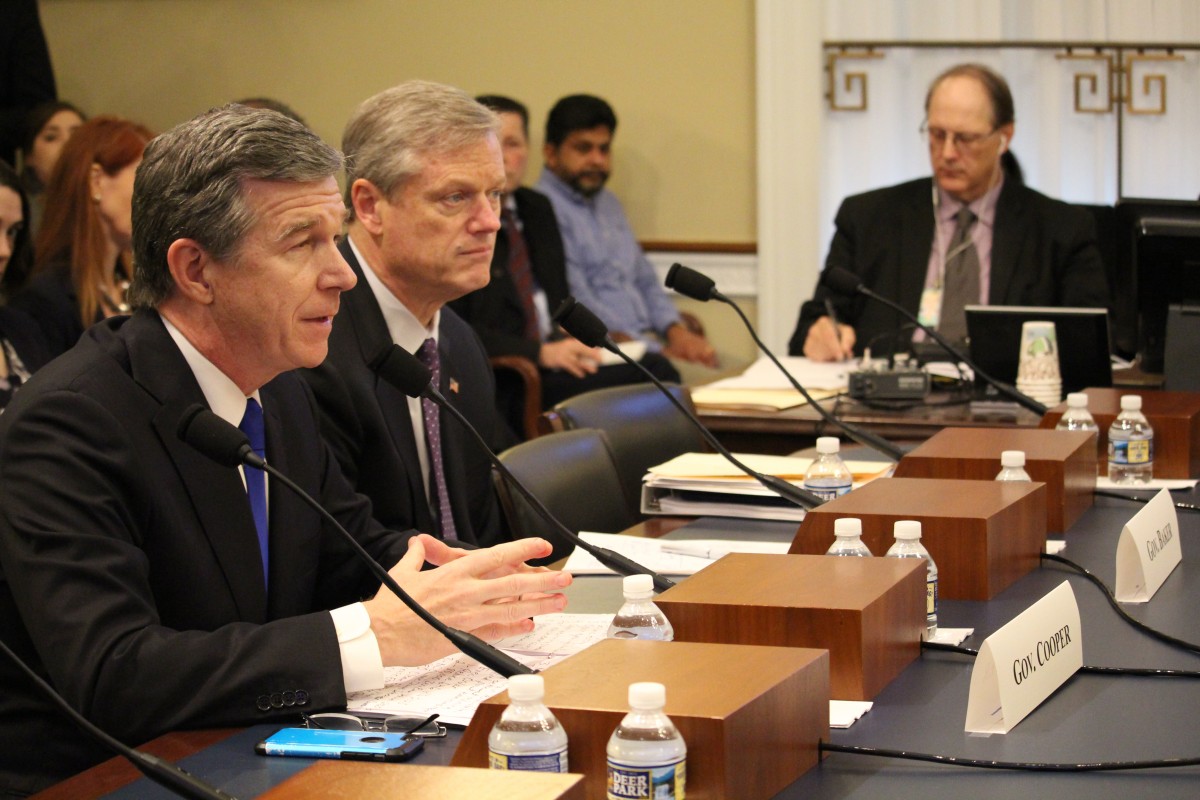The Senate Energy and Natural Resources Committee will begin holding full hearings this week with a new top Democrat: West Virginia Sen. Joe Manchin.
Manchin’s ascension to lead the Senate committee devoted to energy issues drew concern from environmental groups and more left-leaning members of his own party who fear the centrist Democrat may not be a strong climate advocate.
At a recent meeting of West Virginia oil and gas producers, the senator from coal country said he hoped to address climate change in this role, but would also use his newfound post to better promote the Ohio Valley’s energy resources.
Manchin, who said he will have a staff of about 17, will work closely with Sen. Lisa Murkowski (R-AK), who chairs the committee.
“The beauty about it is this: Lisa comes from Alaska, I come from West Virginia. Two heavy-lifting states, two heavy-producing states for the energy this country needs,” he told attendees of the West Virginia Independent Oil and Gas Association winter meeting last month in Charleston. “With that being said, we can set an agenda that basically shows them what we’re doing.”
Manchin said he hopes to highlight the energy contributions made by West Virginia and other states in the region from both the coal and growing natural gas industries.
“We haven’t been able to tell our story,” he said. “We’re just not telling it because there’s a strong wind blowing that doesn’t want that to get out. They want to believe there’s something utopian in a perfect world. Well, I’m hoping we get there in our lifetime. I don’t think so. Maybe our children or grandchildren, whatever. But until that happens I want to make sure they understand the ships from Russia are bringing natural gas in to the northeast. I want them to see that picture.”
‘All-In Energy Policy’
Environmental groups have expressed concern about Manchin taking the top spot on the Senate Energy and Natural Resources Committee in large part over fears the coal country Democrat will not be a strong voice for climate action.
In recent years, Democrats on the committee have used their positions to rail against Trump administration efforts to backtrack on climate policies and science.
Manchin has been steadfast in his position that while he believes climate change is real and that the country needs to prepare for its impacts, he will advocate for energy policy that contains a mixture of emissions-free electricity including renewables, but that also includes the use of fossil fuels for the foreseeable future. That is a break from some in the Democratic party who are seeking the immediate phase-out of fossil fuels in order to prevent the worst impacts from climate change.
“I’ve got a far left agenda coming from the people in my caucus, and I tell them basically that we’re looking for an all-in energy policy,” Manchin told the crowd.
Speaking after the meeting, Manchin also noted both he and Murkowski are pragmatic about the threat of a changing climate.
“We understand energy, we understand climate,” he said. “We understand that we have to live in this wonderful, beautiful world of ours, make it cleaner and better, but use all the energy we have in a much cleaner fashion.”
Manchin declined to provide examples of specific legislative proposals he might champion, but said investing in technology and research would be a top priority.
In preparing to take his post as second in command, Manchin said he had spent some time chatting with Microsoft founder and philanthropist Bill Gates. The billionaire has invested significantly in clean energy, including nuclear power. Manchin characterized Gates as pragmatic about the need to balancing clean energy and fossil fuels, and said he hoped to bring him to the committee.
Storage Hub Major Priority
The lawmaker also stressed his commitment to building more natural gas liquids storage capacity in the Ohio Valley. Specifically, Manchin noted his continued support for the Appalachian Storage and Trading Hub.
Manchin has long been a proponent of the project, now almost a decade in the making. It would be built with a combination of private investment and a $1.9 billion loan guarantee from the Department of Energy, which is being applied for by the project’s developer, the Appalachia Development Group, LLC.
A year ago, the project got approval for the first of two application phases for a $1.9 billion U.S. Department of Energy loan. Last summer, ADG announced it was hiring an outside firm, Parsons Corporation, to help with the second phase and data collection.
“It’s like the field of dreams, build it and they’ll come,” he said of the hub. “I think everything leads from that if people know we have available, dependable and affordable energy there to be accessed for the development that we need for our state, our region and our country, defense of our country, that’s a no-brainer.”
The full committee kicks off hearings this week. On Tuesday, it will hear testimony about the state of the country’s energy and mineral markets. On Thursday, it will hold a hearing on energy innovation in the United States.
This article was originally published by WV Public Broadcasting.



